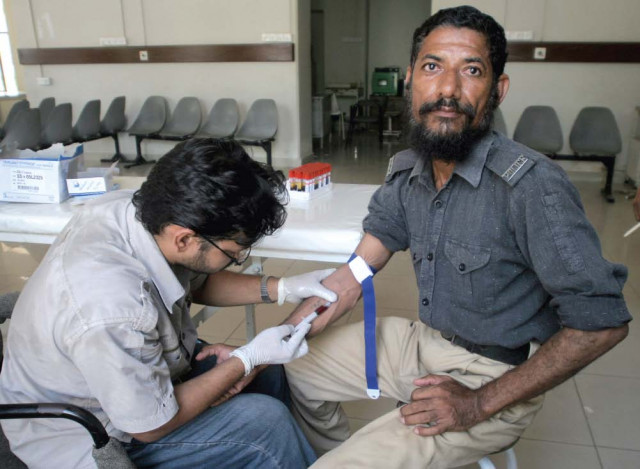‘Hepatitis grips Faisalabad’
Few hospitals in district have facilities to cure the disease

Groundwater contamination, use of infectious surgical instruments and adulterated food is wreaking havoc in Faisalabad as over one-fourth of the local population may be infected with different types of hepatitis, a health expert has warned following screening of residents in a number of villages.
An abode to nine million people, the Faisalabad district randomly has over two million people infected with this injurious disease, especially Hepatitis C, posing serious challenges to the health authorities in treating the patients.
With nearly three dozen well-known hospitals in the city, a few have proper treatment facilities to cure hepatitis C, but most of the remaining hospitals lack proper equipment. Only the Liver Centre at the Allied Hospital-II, which is being run on a public-private partnership basis, has the latest facilities, but it is stated to be too costly for the poor patients who are the dominating demography of the district.
Most of the city's population was dependent on underground water, but the mushroom growth of mills and factories had polluted underground water in most areas in recent decades.
Read: Continuous rise in hepatitis cases rings alarm
“The situation is critical as 28% of people are suffering from Hepatitis C alone and 4% from other types of hepatitis," said the Chairman of the Liver Foundation Trust, Prof. Dr. Zahid Yasin Hashmi, who is also a former principal of the Punjab Medical College.
He revealed that the Liver Foundation conducted free screening of hepatitis in 270 villages around Faisalabad, and the cumulative number (32%) was alarming. "Most people ignore the gravity of this disease and bring patients to hospitals when the disease is at an advanced stage. In the case of such patients, the recovery chances are very low."
Hashmi regretted the lukewarm response of the government to this challenge. "We had floated a proposal in 2007 for liver transplant in Faisalabad, costing Rs2 million at a time when such a facility was established in India for Rs4 million."
Although the Water and Sanitation Agency (WASA) is mandated to supply water, it can provide potable water to only 40 percent populace with 60 percent still using water from other sources.
There are also complaints of water contamination in these decades old laid down WASA managed pipelines as some of them were already damaged, making way for sewage to mix with fresh water.
"Contaminated water and food items were the main causes of hepatitis A and E while hepatitis B, C and D spread due to the use of infectious surgical equipment," said another health expert, Dr. Muhammad Anas.
Also read: Hepatitis patients get free medication
"There are very startling facts about testing facilities for adulterated food items in our country. Many adulterated food items are freely available in our market," he stated.
The Pakistan Standards and Quality Control Authority (PSQCA), an organisation meant for prescribing quality standards, has its office in Faisalabad, but there is no lab for immediate testing of food quality. Although the Punjab Food Authority (PFA) also conducts random operation across the province and confiscates substandard food items, small outlets and vendors are kept hidden from their view.
One-hundred-and-fifty water filtration plants were installed in different parts of Faisalabad, but their capacity was insufficient to meet the portable water demand of the populace. District Health Authority (DHA) spokesman Abdur Razzak said the prevalence of hepatitis C was higher in the rural population due to the use of infected surgical and injecting materials and unhygienic food.
"All types of hepatitis (A to E) are prevalent in Faisalabad, but the number of patients suffering from Hepatitis-C is much higher," he said.
Published in The Express Tribune, October 30th, 2023.



















COMMENTS
Comments are moderated and generally will be posted if they are on-topic and not abusive.
For more information, please see our Comments FAQ